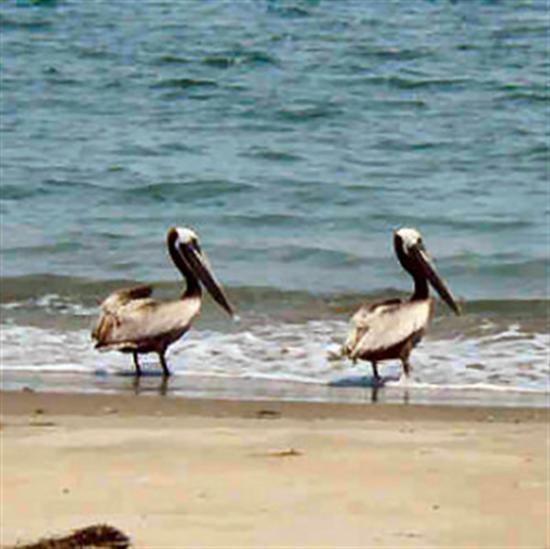Congresswoman Kathy Castor announced today that she and Louisiana Congressman Steve Scalise have created the bipartisan Gulf Coast Caucus to help address emergencies, and discuss legislation and policy affecting the Gulf Coast. Caucus members – Democrats and Republicans – will work together to find ways to boost the Gulf Coast economy and environment, which were severely affected by last year’s BP Deepwater Horizon disaster. The group’s work will focus on issues including oil-related restoration and recovery, hurricane response efforts, tourism and seafood marketing.
Castor today talked about the caucus and her legislation to restore the Gulf Coast at the Ocean Leadership Policy Forum in Washington, D.C.
Castor, a Democrat, and Scalise, a Republican, are the co-chairs of the caucus.
“Rep. Steve Scalise and I will work together, in a bipartisan way, to protect the jobs and interests of our communities. Small businesses, the tourism industry, the environment and fishermen continue to suffer from the oil disaster. Working together with other members of the Gulf Coast Caucus, we will be stronger in finding ways to protect and revive the Gulf by focusing on oil-related restoration and recovery, hurricane response efforts, tourism and seafood marketing.”
“The BP disaster emphasized the need for those of us along the Gulf Coast to work together to address common problems, and it became evident to me that a Gulf Coast Caucus would help our region recover and also provide a forum for Gulf State Members of Congress to work on legislation that benefits all our states,” Scalise said. “The Gulf Coast is unlike any other region in the nation and is home to a vibrant culture, unique resources, and hardworking Americans.”
Castor also said she looks forward to working with the caucus on her Gulf of Mexico Economic and Environmental Restoration Act, which she re-filed this year, as well as on other bills that address similar issues. The legislation would direct 80 percent of the fines and penalties to be paid by BP for violations of the Clean Water Act to restoring the Gulf Coast.
Castor spoke about her bill today at the Ocean Leadership Policy Forum in Washington, D.C.
“We must protect the Gulf Coast from further damage as we move forward to restoring it back to its natural beauty and getting the Gulf Coast’s economy back on track,” Castor said.
The bill would implement the recommendation made in September by Navy Secretary Ray Mabus in his report, America’s Gulf Coast – A Long Term Recovery Plan. Castor’s bill also would implement the recommendation of the National Commission on the BP Deepwater Horizon Oil Spill and Offshore Drilling, co-chaired by former Sen. Bob Graham.
“In our report, we recommend that Congress dedicate 80 percent of the Clean Water Act penalties to long-term restoration of the Gulf of Mexico,” Graham said. “I am happy to see that my good friend Rep. Castor already has proposed legislation to do exactly that. Directing money to Gulf Coast states will help ensure the long-term environmental and economic recovery of our region.”
“Directing BP’s fines to helping the Gulf Coast recuperate is the right thing to do,” Castor said. “Taxpayers shouldn’t be asked to pay one dime for this disaster. BP must make our community whole.”
The fines and penalties cannot, under current law, be devoted to Gulf recovery unless Congress provides that specific direction. Castor first filed her bill in the last session of Congress. She re-filed it to put it on the agenda of the 112th Congress.
The maximum civil penalties under the Clean Water Act could range from $4.5 billion to $21 billion. The final amount will be based on the number of barrels of oil spilled and whether negligence was a factor.
Castor’s bill directs money to the states hit hardest by the disaster. The Act also directs money to bolster the seafood and tourism industries, as well as to vital academic research and monitoring activities.
Other provisions of Castor’s bill include:
- Creating a Gulf of Mexico Advisory Council representative of all Gulf States
- Creating a Gulf of Mexico Economic and Environmental Recovery Fund to be funded by the fines and penalties paid by BP
- Developing state Comprehensive Restoration Plans to provide for economic development, ecosystem restoration and public health rehabilitation for Gulf states
- Establishing a Gulf of Mexico Observation System to develop and deploy new technologies to monitor the Gulf
- Working with the Sea Grant Program to fund restoration projects carried out by sea grant colleges or institutions
- Developing a Gulf of Mexico Seafood Marketing Program to promote the Gulf seafood that accounts for one quarter of the nation’s seafood catch
- Developing a Clean Energy Program to promote the development and use of alternative energy and reduce our dependence on oil.
For more information on Castor’s work regarding the BP oil disaster, go to /Homepage/oildisaster.htm.


